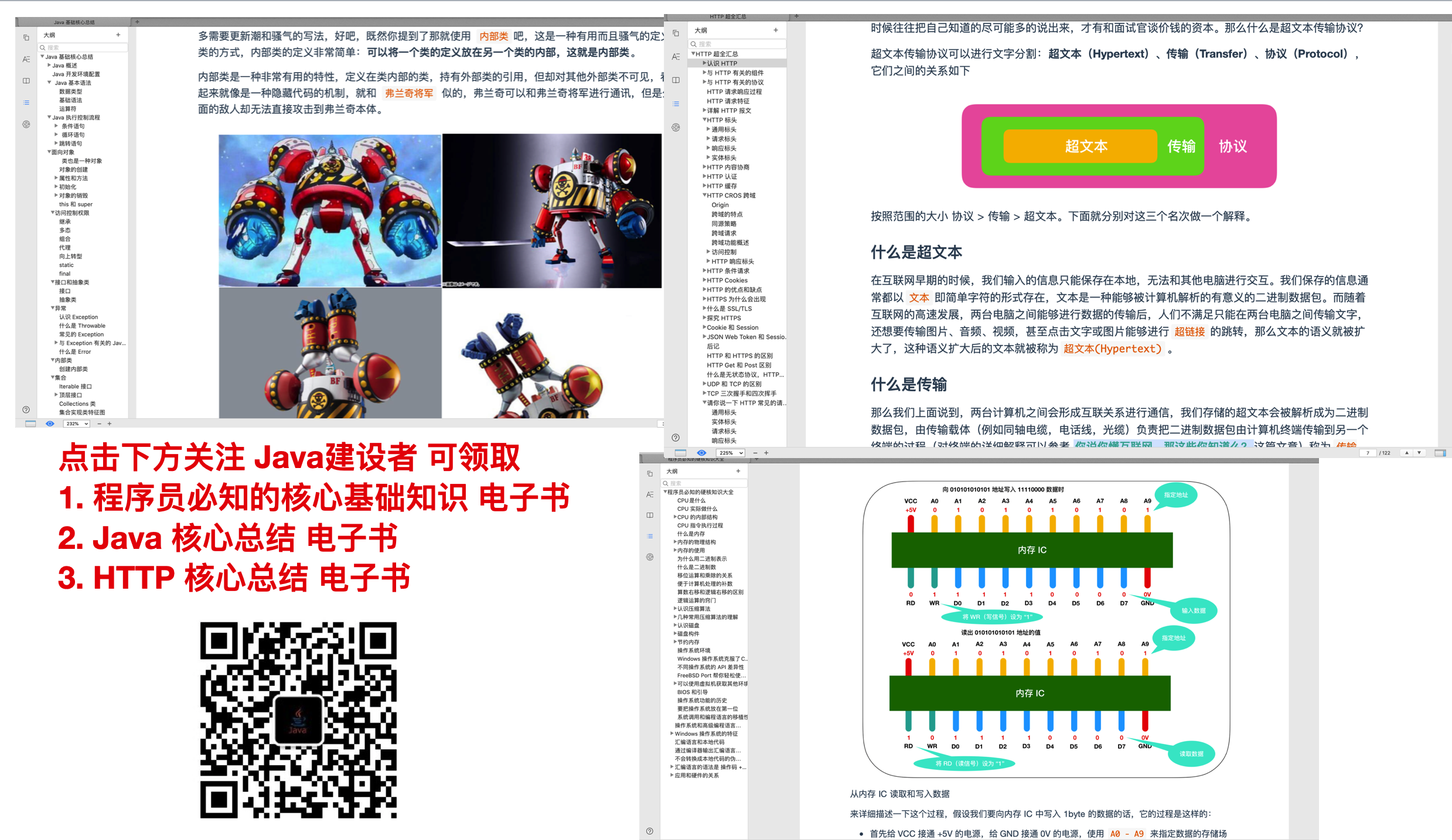Comparable 和 Comparator的理解
对Comparable 的解释
Comparable是一个排序接口
此接口给实现类提供了一个排序的方法,此接口有且只有一个方法
public int compareTo(T o);
compareTo方法接受任意类型的参数,来进行比较
list或者数组实现了这个接口能够自动的进行排序,相关类的方法有Collections.sort(),Arrays.sort();
SortedMap 接口的key内置了compareTo方法来进行键排序,SortedSet 也是内置了compareTo方法作为其内部元素的比较手段
compareTo()方法与equals()方法的比较
compareTo()方法不同于equals()方法,它的返回值是一个int类型
int a = 10,b = 20,c = 30,d = 30;
a.compareTo(b) // 返回 -1 说明 a 要比 b 小
c.compareTo(b) // 返回 1 说明 c 要比 b 大
d.compareTo(c) // 返回 0 说明 d 和c 相等
而equals 方法返回的是boolean 类型
x.equals(y) // true 说明x 与 y 的值 相等 , false 说明x 与 y 的值 不相等
代码
Comparable 更像是一个内部排序接口,一个类实现了Comparable比较器,就意味着它本身支持排序;可以用Collections.sort() 或者 Arrays.sort() 进行排序
public class Student implements Comparable<Student>{
String name;
int record;
public Student(){}
public Student(String name,int record){
this.name = name;
this.record = record;
}
public boolean equals(Student student) {
// 拿名字和成绩进行对比
return name.equals(student.name)
&& record == student.record;
}
@Override
public int compareTo(Student stu) {
// 调用String 类的compareTo方法,返回值 -1,0,1
return this.name.compareTo(stu.name);
}
get and set...
}
public class ComparableTest {
public static void main(String[] args) {
List<Student> studentList = Arrays.asList(new Student("liming", 90),
new Student("xiaohong", 95),
new Student("zhoubin", 88),
new Student("xiaoli", 94)
);
// 排序前
System.out.println(studentList);
Collections.sort(studentList);
// 排序后
System.out.println(studentList);
for(Student student : studentList){
System.out.println(student.equals(new Student("xiaohong", 95)));
}
}
}
输出:
[liming = 90, xiaohong = 95, zhoubin = 88, xiaoli = 94]
[liming = 90, xiaohong = 95, xiaoli = 94, zhoubin = 88]
false
true
false
false
对 Arrays.asList() 的解释说明 http://xxxx.com
compareTo()方法抛出异常
public int compareTo(T o);
NullPointerException : 如果 对象o为null,抛出空指针异常
ClassCastException: 如果需要类型转换之后进行比较,可能会抛出ClassCastException
对Comparator 的解释
Comparator 相当于一个比较器,作用和Comparable类似,也是使用Collections.sort() 和 Arrays.sort()来进行排序,也可以对SortedMap 和 SortedSet 的数据结构进行精准的控制,你可以不用实现此接口或者Comparable接口就可以实现次序比较。 TreeSet 和 TreeMap的数据结构底层也是使用Comparator 来实现。不同于Comparable ,比较器可以任选地允许比较null参数,同时保持要求等价关系。
Comparator比较器的方法
int compare(T o1, T o2);
compare() 方法的用法和Comparable 的 compareTo() 用法基本一样,这个方法不允许进行null值比较,会抛出空指针异常
boolean equals(Object obj);
jdk1.8 之后又增加了很多新的方法
很多都是关于函数式编程的,在这里先不做讨论了
代码实现
public class AscComparator implements Comparator<Student> {
@Override
public int compare(Student stu1, Student stu2) {
// 根据成绩降序排列
return stu1.getRecord() - stu2.getRecord();
}
}
public class ComparatorTest {
public static void main(String[] args) {
List<Student> studentList = Arrays.asList(new Student("liming", 90),
new Student("xiaohong", 95),
new Student("zhoubin", 88),
new Student("xiaoli", 94)
);
// 1. 可以实现自己的外部接口进行排序
Collections.sort(studentList,new AscComparator());
System.out.println(studentList);
// 2、 可以匿名内部类实现自定义排序
Collections.sort(studentList, new Comparator<Student>() {
@Override
public int compare(Student stu1, Student stu2) {
return stu2.getRecord() - stu1.getRecord();
}
});
System.out.println(studentList);
}
}
也可以使用Arrays.sort()进行排序,不过针对的数据结构是数组。
Comparable 和 Comparator 的对比
1、Comparable 更像是自然排序
2、Comparator 更像是定制排序
同时存在时采用 Comparator(定制排序)的规则进行比较。
对于一些普通的数据类型(比如 String, Integer, Double…),它们默认实现了Comparable 接口,实现了 compareTo 方法,我们可以直接使用。
而对于一些自定义类,它们可能在不同情况下需要实现不同的比较策略,我们可以新创建 Comparator 接口,然后使用特定的 Comparator 实现进行比较。

|
作者:cxuan 出处:https://www.cnblogs.com/cxuanBlog/ 本文版权归作者和博客园共有,未经作者允许不能转载,转载需要联系微信: becomecxuan,否则追究法律责任的权利。 如果文中有什么错误,欢迎指出。以免更多的人被误导。 |


 浙公网安备 33010602011771号
浙公网安备 33010602011771号